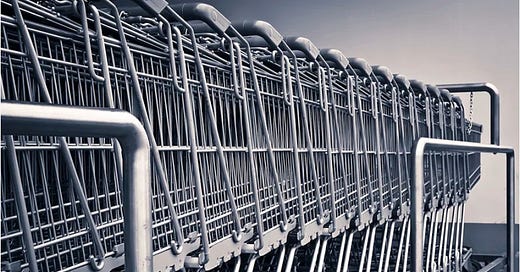Price controls are the right policy, for the wrong reasons
Sunak's supermarket proposal will help to tackle inflation, but must be part of, not in place of, a wider package of cost-of-living support
If The Telegraph is to be believed, the Sunak government is considering asking the UK’s major supermarkets to reduce the prices of basic essentials, as a response to the cost-of-living crisis.
This will be welcomed by some on the left who have called for the reintroduction of price controls to tackle extraordinarily high inflation. But we should be careful what we wish for. This may well represent the correct policy response – although it will be a voluntary agreement, with limited application – but its place within the government’s wider strategy warrants scrutiny.
Explaining inflation
The current inflationary period has three main causes – none of which correspond with the mainstream discourse on inflation.
First, the disruption to supply chains. The immediate trigger for this globally was the COVID-19 pandemic. The war in Ukraine has had an enormous impact on energy costs in particular (as well as a direct impact on food supply chains). The impact of Brexit on trade with continental Europe has exacerbated these conditions in the UK.
Second, as analysis by Isabella Weber and Evan Wasner, Chris Hayes and Carsten Jung, and Adam Tooze shows us, inflation is being driven by corporate profits: profiteering increases in a crisis, enabled by monopolistic conditions.
The third cause is higher demand. But whereas the government and central bank want us to believe that inflation is explained by workers’ excessive spending power (the so-called ‘wage-price spiral’), demand is coming mainly from wealthy households drawing down savings built up during the pandemic. Inflation is the cost of inequality.
Taking control
Higher interest rates and public spending restraint will do nothing to address the real causes of inflation. Instead they will make the cost-of-living crisis more severe, by increasing the cost of borrowing for a heavily indebted population, and risking higher unemployment.
Among other things, the strategic use of price controls is going to be necessary to bring down living costs. In fact, as the impact of climate change deepens, we can expect inflation to be volatile for the foreseeable future – perhaps forevermore – as we confront what James Meadway refers to as the ‘cost-of-adaptation’ crisis.
Price controls have been used before to great effect, when similar economic upheavals have disrupted production and facilitated profiteering. Their use really should not be controversial, rather a regular part of economic policy-makers’ toolkits.
But it is not the potential economic impact of price controls that has spooked the right. It is the signal their reintroduction sends about the demise of neoliberalism, which has long professed the market knows best, while turning a blind eye to the market-distorting effects of corporate power.
This explains, for instance, The Telegraph’s furious reaction to its own scoop, with several op-eds recently denouncing Sunak’s proposal, alongside sustained coverage of business leaders’ reservations.
Avoidance
The Energy Price Guarantee was a first step, of sorts, in this regard. Yet the difference between the price energy customers pay, and what the retail cost would otherwise be, is being taken out of the public purse, not energy company profits.
The supermarket proposal has no fiscal impact, but in theory represent a more substantive form of market intervention insofar as it asks private companies to adjust their profit expectations. It would be reasonable to suggest that the UK’s food retail industry is highly concentrated, and characterised by high profits. Its main players are partly responsible for inflationary conditions because they have been squeezing their suppliers – increasing reliance on cheap imports – for decades. A gentleman’s agreement to keep prices down is too lenient a sentence.
We can also point to the Sunak government’s reluctance to institute even the most basic industrial policy measures to protect strategically significant supply chains. Jeremy Hunt is demanding that private pension funds invest more in the British economy – something that the government itself seems reluctant to do.
Above all, we should consider how price controls might simply be a way of avoiding the most important thing we can do to alleviate rising living costs: building a proper welfare state.
The government has introduced Cost of Living Payments – temporary and poorly targeted additional support – as well as further energy bill discounts. This may allow politicians to perform ‘crisis management’ at the despatch box, but also exposes the fact the UK’s regular welfare system is struggling to cope.
For example, Citizens Advice data on food bank referrals shows a small dip in demand when the first payment was made in July 2022 – but the effect quickly disappeared. There was no dip in demand for debt advice at the same time: people use these payments immediately to pay for daily essentials, without any sustainable impact on their financial circumstances.
Low-income households need more support than is currently available from the UK’s threadbare welfare state to meet rising living costs. Permanent uplifts in benefit levels would cost more than one-off payments, but by introducing higher taxes on wealthier households to finance additional welfare spending, the government would at the same time be helping to address one of the actual causes of inflation, rather than the phantom menace of wage growth.
Price controls are also part of the answer to inflation. It would be churlish therefore not to acknowledge that Sunak’s supermarket proposal is potentially another step in the right direction. But we should be wary that, for the government, it is being used instead of, not alongside, a wider set of measures to address the causes and impact of inflation.





